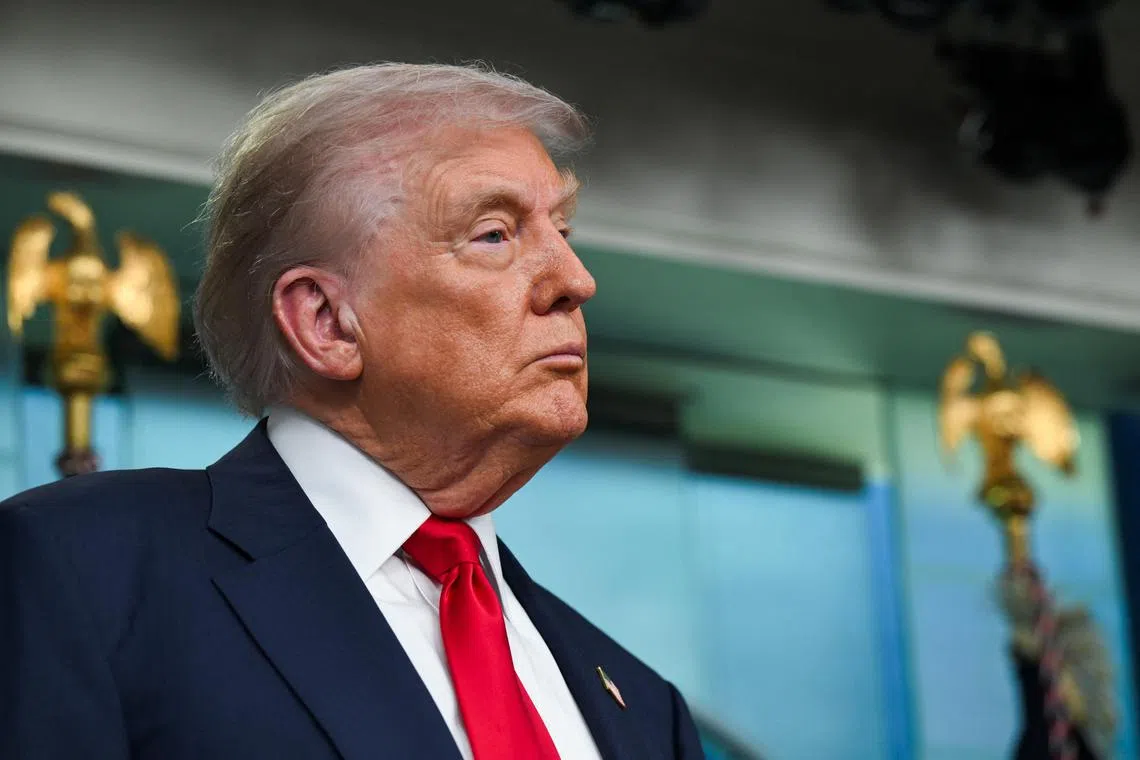News analysis
Trump bid for cut of Nvidia, AMD chip revenue risks ‘dangerous world’
Sign up now: Get ST's newsletters delivered to your inbox

The Nvidia and AMD revenue-sharing deals could prompt the Trump administration to target other industries and goods.
PHOTO: REUTERS
Follow topic:
Hong Kong - The revenue-for-exports deal between the US government and two of the world’s biggest chipmakers opens a new front in a trading regime turned upside down by US President Donald Trump.
Nvidia and Advanced Micro Devices (AMD) agreed to pay the US government 15 per cent of revenue
“To call this unusual or unprecedented would be a staggering understatement,” said Mr Stephen Olson, a former US trade negotiator now with the Singapore-based ISEAS – Yusof Ishak Institute. “What we are seeing is in effect the monetisation of US trade policy, in which US companies must pay the US government for permission to export. If that’s the case, we’ve entered into a new and dangerous world.”
The chip-payment arrangement may face legal challenges because it could be construed as an export tax, something that is not allowed under the Constitution, trade experts said.
The proposal is the latest direct government intervention into business and finance since Mr Trump returned to the Oval Office in January. As well as a chaotic tariff campaign and persistent criticism of a sitting Federal Reserve chairman, Mr Trump has used his Truth Social platform for everything from calling on chief executives to resign to offering commentary on corporate advertising campaigns.
Mr Trump’s transactional policy approach saw him approve the sale of United States Steel Corp to Japan’s Nippon Steel in a US$14.1 billion (S$18 billion) deal that included caveats such as agreeing to US national security rules and a “golden share” for the US government. Japan, South Korea and the European Union all pledged to invest billions in the US, helping secure tariff rates of 15 per cent, while companies such as Apple have also skirted levies by promising to invest hundreds of billions of dollars.
The Nvidia and AMD revenue-sharing deals may now prompt the White House to target other industries and goods, according to Dr Deborah Elms, head of trade policy at the Hinrich Foundation in Singapore.
“The sky is the limit,” she said. “You could come up with all sorts of company-specific, country-specific combinations that would say, ‘No one else can trade, but if you pay us directly, then you get the ability to trade.’”
The Trump administration is already in the midst of a lawsuit related to his use of the International Emergency Economic Powers Act to levy what he called “reciprocal” tariffs on the world. On Aug 8, Mr Trump warned of a “GREAT DEPRESSION” if US courts ruled that his tariffs were illegal.
Chips are at the heart of the US-China battle to dominate industries of the future, such as artificial intelligence (AI) and automation. The Biden administration restricted the sale of advanced chips to China, prompting Nvidia to develop the H20, which skirted such restrictions. Trump administration officials tightened export controls in April by barring Nvidia from selling the chips without a permit.
In July, however, the White House decided to allow Nvidia and AMD to resume sales of chips designed specifically for the Chinese market, which are several rungs below the most advanced AI accelerators. US Commerce Secretary Howard Lutnick said the administration wanted Chinese developers “addicted” to American technology.
China has grown increasingly hostile to the idea of Chinese firms deploying the H20, particularly after the US called for the chips to be installed with tracking technology to better enforce export controls. Yuyuan Tantian, a social media account affiliated with state-run China Central Television that regularly signals Beijing’s thinking about trade, on Aug 10 slammed the chip’s supposed security vulnerabilities and inefficiency.
Still, Chinese companies could use the H20s because domestic firms cannot produce enough AI chips to meet demand. That potentially provides an opportunity for Nvidia and AMD to sell more – and now for the US government to earn additional revenue as well.
Mr Trump on Aug 11 signed an order extending a 90-day tariff truce between the US and China,
“There’s clearly a shift by the administration to take a lighter national security stance as these negotiations are ongoing,” said Mr Drew DeLong, the lead in geopolitical dynamics practice at Kearney, a global strategy and management consulting firm.
According to Dr Scott Kennedy, senior adviser at the Centre for Strategic and International Studies in Washington, while the US has intervened before, including by taking stakes in private companies after the 2008 financial crisis, a similar deal like the one struck with Nvidia and AMD is hard to remember and – without proper oversight – could lead to a “crony capitalism state”.
“It represents a huge shift in the way the American economy is supposed to operate,” Dr Kennedy said. “It won’t make anyone happy except maybe the Chinese, who will get their chips and watch the US political system go through gyration and domestic tensions.” REUTERS

